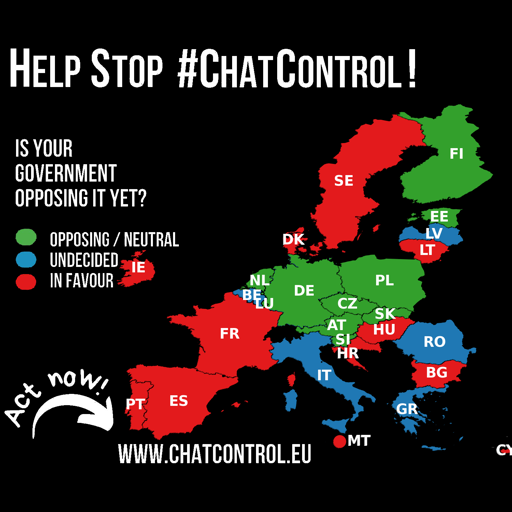Chat Control didnt pass - they didnt even vote because they were afraid the result would be embarassing.
And we got told so many times, that EU now wants Chat Control. But it was a big fat lie.
EU is a democracy with different opinions, and when a small group of facists tries to read your chats, it does not represent the EU opinion.
But the whole media got you thinking so. Proving even on Lemmy, you and me are extremly prone to propaganda.
I quoted the article here with the news:
In a major breakthrough for the digital rights movement, the German government has refused to back the EU’s controversial Chat Control regulation yesterday after facing massive public pressure.
The government did not take a position on the proposal.
This blocks the required majority in the EU Council, derailing the plan to pass the surveillance law next week.



What? LOL Who do you think is pushing said “propaganda” to make people fear Chat Control unnecessarily?
It was demonstrably not a lie. There were so many regions in support of it that it was dangerously close to passing.
I’m thinking this post is the propaganda. Really really lazy propaganda.
Don’t worry, it’ll be back again in a few months with a new coat of paint.
Correct me if I’m wrong, but - it wasn’t “close to passing”, it was “close to being passed on as a proposal for a law”, requiring then a formal vote, no?
So, even if Germany retained its support and the motion went forward, it could still get smashed during the vote.
I think you’re misreading it and badly.
I read it as: “don’t believe those who panicked that the EU is a fascist dictatorship that wants to subjugate the population, because it’s still a democracy where the people have the power, as proven by Chat Control being thrown in the bin yet again”.
It’s the same thing. Why would a country show support for the legislation and then vote against it later?
This is such a charitable reading that it’s probably fair to assume this is OPs alt account.
It absolutely is not. I don’t know, maybe you’re more familiar with the US federal system (pre-Trump, because that’s a different can of worms)? If so: imagine if the president (in this case having no ability to issue executive orders, mind you) says “we should do X”. That’s all well and good, but the X must still go through the Senate and Congress, where it might fail.
Well, because “a country” is not a singular hive-mind, is it? The government says “yes”, but their own Parliament might say “no”.
Governments have no say in what goes on in the EU Commission or Parliament. I mean, sure, most of the time the MEPs coming out of the government-aligned parties will have similar votes, but the EU elections aren’t in-step with most countries’ elections, so it’s never a 1:1 translation. And even then, many MEPs will just vote on their own.
Holy fuck, watch out when opening the fridge, mate, OP might jump out of it!
Why risk it even being considered for a law, when so many governments have become emboldened by Taco to show their real colours? The soonest it can be put down to rest, the better.
It really wasn’t. It couldn’t have been close to passing without a vote even taking place. The vote was scheduled for October 14th. However, since countries representing more than 35% of the EU population have declared their opposition to this proposal, it has been canceled.
A lot of countries have indeed declared support, though this is completely separate from the vote. There, it’d require a qualified majority (55% of member states in favor, or countries representing 65% of the EU population in favor). Looking at MEPs’ public statements, it’s unlikely that the vote would have passed.
Nonetheless, it remains troubling that they keep trying to force this proposal through. We have to push back every single time, but they only need it to pass once. Who knows what the future may hold.
Huh? Do countries voicing their approval or disapproval not count as a “vote”?
That’s not even half…
That’s because, as you mentioned earlier, the vote never happened.
Which, according to your own numbers, they already had.
No. The stances of countries are the [leaked] stances of their respective governments. Which may or may not reflect the views of the country’s MEPs. You can read more here: Fight Chat Control
True, and that’s indeed very concerning. However, it should be noted that this is not how many countries are against this proposal, but how many countries oppose it enough to reject it before voting. Many countries currently ‘undecided’ are likely to vote against the proposal in the end (if a vote took place). Likewise, some of them could vote in favor.
Not at all. I mentioned that, with Germany changing their stance to against, we had over 35% of the EU population against. Which means in favor and undecided both had less than 65% together. Right now I can’t count the populations, but there’s 12 countries in favor, 9 against and 6 undecided. This by no means gives the countries in favor a qualified majority. Unless all in favor and at least half of undecided (3 countries) fully voted in favor. Which is fairly unlikely.
Additionally, as I mentioned above, these numbers are for the member states’ governments, not their MEPs. Usually MEPs are more pro-people, but of course, it depends on the country and its current government.